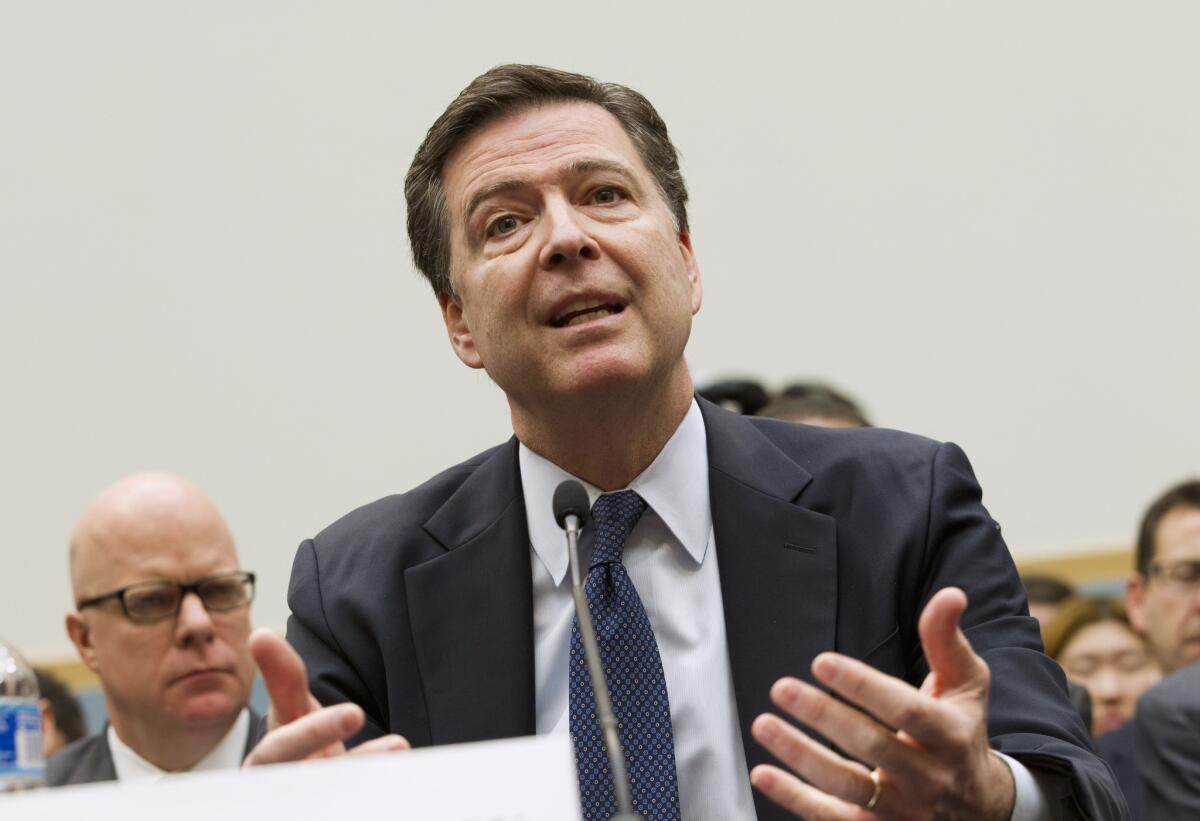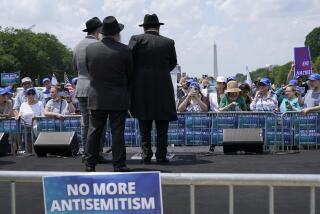FBI says fewer Americans now try to join Islamic State

The number of Americans trying to join Islamic State overseas has dropped substantially since last summer, FBI Director James B. Comey said Wednesday, as the terrorist group has come under increasing pressure.
FBI agents have tracked an average of one person a month trying to travel, or actually traveling, to join the extremist group in Syria and elsewhere in the Middle East since August, Comey told a news conference.
That compares to as many as 10 Americans a month in 2014 and during the first half of 2015, he said.
Islamic State’s “brand has lost significant power in the United States,” Comey said.
Comey said terrorist groups remain dogged in their recruitment efforts, however, particularly through social media.
The FBI has investigated about 1,000 cases — up from 900 a year or so ago — to determine whether a suspect is consuming terrorist propaganda, or acting on it, Comey said. About 80% involve Islamic State.
He spoke as federal prosecutors in Minneapolis made opening arguments in a trial of three Somali Americans accused of plotting to help the terror group.
The three are among dozens of Americans who have been charged with supporting Islamic State, though only a handful have gone to trial. Six individuals connected to the Minneapolis case have pleaded guilty, and one reportedly has gone to Syria.
U.S. officials previously noted an ebbing of the flood of foreign recruits to the Sunni militant group from around the globe as the U.S.-led coalition has stepped up efforts to counter its online propaganda, kill its leaders and track potential recruits.
Islamic State has lost large parts of its claimed territory in Iraq and Syria over the past year, but the group still controls several major cities in its self-declared caliphate and has upward of 30,000 foreign fighters.
Even as it suffers losses, Islamic State has lashed out with lethal terrorist attacks in Paris, Brussels, Baghdad and elsewhere. The couple who killed 14 people in December in San Bernardino had claimed allegiance to Islamic State but had no direct links to the group.
In an hourlong session with reporters, Comey was tight-lipped about several ongoing investigations.
He declined to explain how the FBI cracked the iPhone used by one of the San Bernardino killers. The FBI previously said that it paid a third-party to unlock the encrypted device, and Comey has suggested it cost more than $1 million to do so.
He would not provide a more specific figure Wednesday. “People understand it cost a lot of money,” he said.
Comey said he is carefully monitoring the FBI investigation of Democratic presidential front-runner Hillary Clinton’s use of a private email server while she was secretary of State from 2009 to 2012. He declined to provide details, however.
“We want to do it well, and we want to do it promptly. I feel pressure to do both of those things,” Comey said. “Between the two things, we will always choose ‘well.’ ”
The FBI has been investigating whether Clinton or any of her aides mishandled classified information in thousands of work-related emails that passed through the private computer server, which was in the basement of her home in Chappaqua, N.Y.
The FBI has begun interviewing some of Clinton’s aides, but she said last weekend that agents have not yet asked to meet with her. The investigation is believed to be in its final stages.
Asked whether Clinton was correct in characterizing the probe as a “security inquiry,” Comey said he didn’t know what that term meant. He said the FBI is conducting an investigation, though he would not say whether it was criminal in nature.
“I’m not familiar with the term ‘security inquiry,’ ” he said.
ALSO
Oregon wildlife refuge occupier arrested on weapons charge
Graphic videos, luring tweets — terrorism trial zeros in on Islamic State recruiting
Deadly 2013 Texas fertilizer plant explosion was criminal act, officials say
Twitter: @delwilber
More to Read
Start your day right
Sign up for Essential California for news, features and recommendations from the L.A. Times and beyond in your inbox six days a week.
You may occasionally receive promotional content from the Los Angeles Times.







